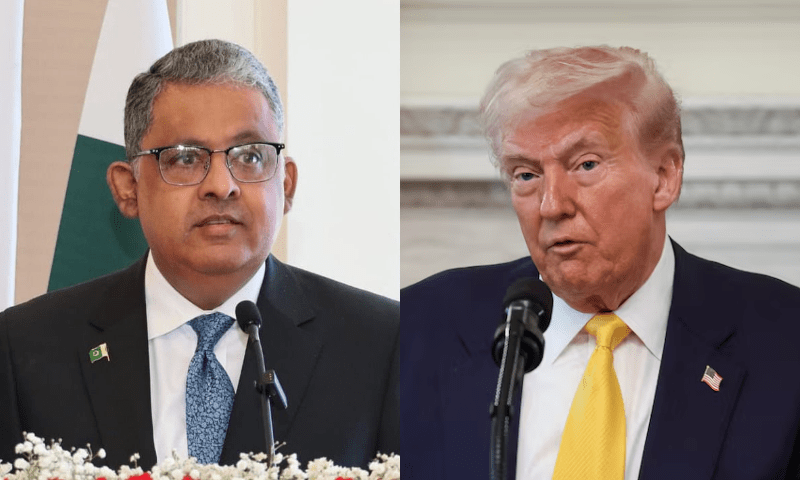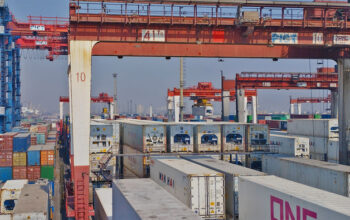By Staff Reporter
ISLAMABAD: Pakistan’s ambassador to the United States has called on President Donald Trump to step in and mediate the worsening Kashmir conflict with arch-rival India.
His plea comes after an attack last week in the disputed region killed 26 people, mostly tourists, raising fears of a broader war between the two nuclear-armed neighbors.
In an interview with Newsweek, Ambassador Rizwan Saeed Sheikh stressed the urgency of US involvement, describing Kashmir as the world’s most perilous hotspot.
“If we have a president who is standing for peace in the world as a pronounced objective during this administration, to establish a legacy as a peacemaker, or as someone who finished wars, defied wars and played a role in de-confliction, resolving the disputes, I don’t think there is any higher or flashier flash point, particularly in nuclear terms, as Kashmir,” Ambassador Sheikh said. “We are not talking about one or two countries in that neighborhood who are nuclear capable. So, that is how grave it is.”
The attack struck Pahalgam in occupied Kashmir, during a visit by US Vice President JD Vance and his family to India. It was the deadliest assault on civilians in the region in 25 years. India responded by giving its military full freedom to act and halting the 1960 Indus Waters Treaty—a pact that governs shared rivers, prompting Pakistan to warn of potential war.
Sheikh said the Trump administration need to pursue a “more comprehensive and sustained initiative” than witnessed in past US attempts to defuse crises that have erupted between the two South Asian archrivals.
“So, I think with this threat that we are facing, there is a latent opportunity to address the situation by not just to focus on an immediate de-escalatory measure, or a de-escalatory approach,” Sheikh said, “but to try and get this out of the way in a fashion that there is something more durable and lasting in terms of a durable solution of the Kashmir dispute rather than allowing the situation to stay precarious and pop up again and again at the next drop of a hat on this side or that side.”
Sheikh pushed back against India’s claims that Pakistan orchestrated the attack, which The Resistance Front, a group India ties to the Pakistani militant outfit Lashkar-e-Taiba, took credit for.
“Pakistan is focusing on a matter of a deliberate, considered, pronounced shift of our foreign policy, a pivot from geopolitics to geoeconomics,” he said.
“We are focused on the geoeconomics side of our geography and our foreign policy. We are currently economically ascendant. The only thing that we need in terms of the broader region in such a pursuit and such a setting, is basically peaceful neighborhood. We need a peaceful neighborhood. So, we would not even be the last ones to think of this kind of adventurism, because it’s currently not any way near, not even on the radar, it is not just even on the horizon for us in terms of our national thought process right now. So, that is where we are, and this is so outlandish, so far-fetched, to blame Pakistan for this.”
The envoy also raised the idea that India might have staged the attack to blame Pakistan, though he admitted there’s no proof.
“When I am saying that it can be a false flag operation, I have no evidence. So, I’m making that allowance, but we have no evidence that this is a false flag operation,” Sheikh said. “But there is enough circumstantial evidence, there is enough history, or there is enough immediate backdrop and setting that suggests at least, to be able to entertain that possibility and not discount it in any way.”
“But of course, since we are seeking evidence of any such thought or any such allegation or accusation ourselves from the Indian side, we would be also responsible enough to look for such evidence. Nothing as of now, but it cannot simply be discounted.”
At the heart of the tension, Sheikh argued, is Kashmir itself. “Until and unless that final settlement is made and the resolutions dictate the prescribed solution is allowed to play out, we will all keep having these problems,” he said. “That’s why we insist on now the United States and others playing a role in this situation and getting the de-confliction part activated. The dispute should be resolved. If that dispute is resolved, I think in that region that houses one-fifth of humanity can live in peace. All the other issues between Pakistan and India are not major issues.”
Tensions over water are adding fuel to the fire. India’s move to suspend the Indus Waters Treaty threatens Pakistan’s agriculture, which relies heavily on the Indus river system.
“We don’t know what it implies,” Sheikh said, “but if there is even an attempt, or a semblance of an attempt, to stop or hold—which is physically actually impossible, but still—if there is a design to hold the water back for an agrarian economy, which has not just been agrarian in the past four or five or 10 years, it has been agrarian for millennia, then it’s a declaration of war.”
Pakistan was also less inclined toward conflict, he said, since it is “a smaller country” than India, its massive population of 250 million people dwarfed by the roughly 1.4 billion populations of both India and China. He also argued, however, that Islamabad would at the same time continue to uphold its core beliefs regarding Kashmir and defend its territorial integrity in the event of a conflict erupting.
“We do not want to fight, particularly with a bigger country,” Sheikh said. “We want peace. It suits our economic agenda; it suits our nationhood. It suits every objective that we have currently. But we want peace with dignity. We would not want to do it, but if it is imposed, then we would rather die with dignity than survive with indignity.”
Copyright © 2021 Independent Pakistan | All rights reserved




